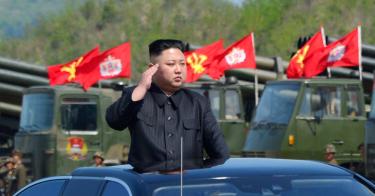Jeong-Ah Kim fled North Korea in search of freedom. In China, she met and married a Chinese man and gave birth to a daughter. But soon she found herself facing another sort of hell. Daily fear of repatriation led Kim to make the difficult decision to flee China to freedom in South Korea, but she was forced to leave her daughter behind.
Kim’s fears of deportation were well founded. Earlier this year, Chinese officials arrested at least eight North Korean refugees. It’s standard practice in these cases for Beijing to forcibly repatriate North Korean refugees. Once back home, they face the prospect of torture, prison terms, maybe even death.
In 2013, Laos and China forcibly repatriated nine North Korean children. Two of them are thought to have been executed. The others have allegedly been imprisoned in Camp 14, a facility notorious for its brutal treatment of political prisoners. This is only the tip of North Korea’s human rights-abusing iceberg. The United Nations Commission of Inquiry on Human Rights in the Democratic People’s Republic of Korea found evidence to suggest that the regime may be found guilty of crimes against humanity. The commission’s report documented that between 80,000 and 120,000 North Korean’s are being held as political prisoners. It also found that the Kim regime has forcibly starved its people and perpetrated severe sexual violence against women.
As a side note, the report suggested that China may be found guilty of aiding and abetting crimes against humanity due to its forcible repatriation of North Korean refugees.
That is why Sens. Marco Rubio (R-Fla.), Ben Cardin (D-Md.), Cory Gardner (R-Colo.), Robert Menendez (D-N.J.), and Ted Cruz (R-Texas) introduced legislation to reauthorize the North Korean Human Rights Act (NKHRA). This legislation represents a positive step toward addressing deplorable human rights conditions in North Korea. It also signals U.S. leadership on human rights challenges internationally.
As Sen. Rubio has noted:
"The regime in Pyongyang systematically and ruthlessly terrorizes its own citizens. Those who flee to China to escape these horrors risk forced repatriation and worse upon their return to North Korea. Children born to Chinese fathers and North Korean mothers are routinely denied their rights to birth registration and nationality.
The Congressional-Executive Commission on China, which I chair, documents these abuses each year in its annual report and has recommended that U.S. policymakers press for greater accountability for China’s treatment of North Korean refugees.
Our bill takes important steps in that direction while also prioritizing human rights and access to information for the North Korean people.”
The NKHRA, if enacted, would press China to discontinue its forcible repatriation of refugees. It would also ensure that U.S. law is carried out, and that any person – North Korean, Chinese or other – found guilty of committing human rights abuses in North Korea is sanctioned.
Critically, the NKHRA would expand information dissemination efforts into North Korea. There is a gross need to improve access to information and to expand the venues through which information is dispersed.
This legislation would continue U.S. government support for radio programming and prioritize organizations that give a voice to North Korean refugees. But it would also go beyond radio programming to fund the application of innovative technologies, such as USB drives, micro SD cards, wi-fi, and other electronic media. The goal is to give North Koreans the information they need to make decisions about whether they will seek freedom abroad or use the information to facilitate change from within.
Many North Korean refugees say that, had they not gained access to information, they might never have known that there is a better life beyond the 38th parallel.
But even after fleeing the brutal Kim regime, women like Jeong-Ah Kim do not always experience true freedom – in large part due to the crippling fear of being repatriated by the Chinese government. The U.S. should move rapidly to help protect the rights of the North Korean people and hold their abusers accountable.
This piece originally appeared in Forbes



